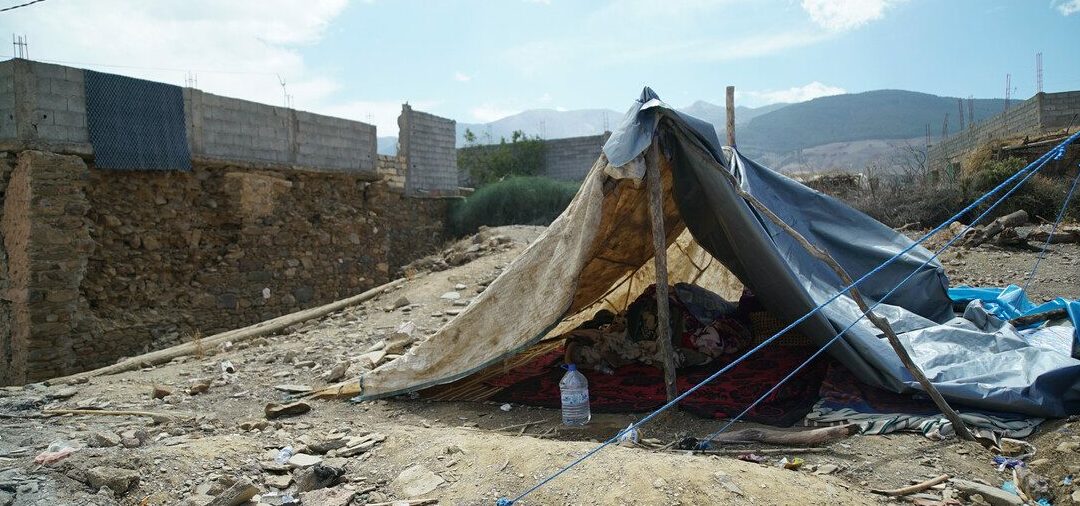Article and photos by Sarah Easter, Emergency Communications Officer, CARE Germany and Austria
“I am lucky, because I can at least hear the loudest and closest explosions. This could one day save our lives.”
Lena and everyone in her family have a hearing impairment, with her father not able to hear at all.
When you hear an explosion in Ukraine you either run, hide or throw yourself to the floor, depending on how close it is. Every child, parent and grandparent knows how to react to save their lives. But what about people who cannot hear the explosions?
“Those who can hear a little or can feel the vibrations or see the smoke send a bomb emoji in our group chat or just ‘Boom’ so everyone knows that they need to find shelter immediately,” explains Lena who is a local leader for an association of around 60 people with hearing impairments in Pokrovsk and the surrounding settlements in Eastern Ukraine.
“The quiet and distant explosions are usually a signal that more missiles are coming. There is never just one and they usually come closer and closer. But we do not hear the distant ones. Therefore, our neighbours help us and tell us when we need to hide,” says Lena.
Lena’s friend Sviatlana accompanies her for moral support. She has a hearing device, but at night she has to take it out.
“Some tell me that they are envious that I do not hear, because then I also do not feel the fear they have. But I feel even more fear because I cannot hide as quick as they do,” says Sviatlana.
Some members of the association have dogs that alert their owners when there are explosions.
“They go completely mad, they run around in circles and bark wildly. So, we take our cues from them and go find cover,” describes Lena.


Lena


Sviatlana
Increased air strikes
“It is very scary. We do not go to sleep before 2 a.m. anymore because most of the time the missiles come before that. But not always. Two nights ago, the rockets came at 3 a.m. We were sleeping and then the whole bed jumped and shook. We then all ran into the corridor to get away from the windows,” remembers Lena.
Now they experience explosions nearly every night.
“We really hate the nights,” begins Lena, pausing because it is emotionally too difficult for her to continue. Sviatlana takes her hand and continues. “We are so afraid for our children and we cannot leave because it is too expensive since we only have a small pension.”
Lena is one of many people with hearing impairments who lost their jobs at the beginning of the escalation of the war two years ago. Finding a job during the war has been difficult for everyone, as many enterprises were destroyed or stopped working—in the first months of the war, nearly 5 million jobs were lost in Ukraine.
“I tried to find a new job. My daughter Sofya asked me to stay home because she is so afraid when I leave the house,” says Lena.
As someone who cannot hear the incoming missiles, it is especially risky for Lena to leave the house.
“You have to drop to the ground immediately after an incoming explosion to save your limbs, but if we cannot hear it coming, what shall we do?”
– Lena
Without a stable income and only the meagre pension of her parents, Lena tries to sell everything that they do not need. The last thing she sold was her daughter’s running shoes, using the money to buy some butter, fresh baked goods and a hot dog for Sofya.
“She used to do field track running at school, but that is over now. She does not need the shoes in war. Whatever we are not able to take with us, if we have to flee suddenly, I sell to survive,” she says.
“We must save on everything because it is not enough. My parents grow a few potatoes and tomatoes in the garden which we can eat,” she continues, and Sviatlana adds, “That is why we are grateful for any humanitarian aid. We received a hygiene kit, which is normally very expensive, and it was very helpful.”
The hygiene kits were distributed by one of CARE’s partner organizations and included some towels, toilet paper, toothpaste, shower gel, soap, wet tissue, sponges and detergent.
“We tried to save as much as possible, so it would last us longer. We also have to save water because the system is overloaded, and we only have water for three days in a week. So, we have full buckets, pans and bottles of water in our apartment everywhere.”
Sviatlana takes Lena’s hand again. “We just wish that people with hearing impairments are considered more in this war. It is very difficult for us to survive.”
How CARE and our partners are supporting people in and around Ukraine
CARE has worked in Ukraine and the surrounding area since 2022, in response to rapidly escalating humanitarian needs due to the escalation of conflict with Russia.
Over the past two years, CARE, along with local partners, has reached over 1.2 million individuals, providing them with essentials for survival. Initially focused on housing and basic needs for internally displaced persons, CARE is now increasingly addressing psychological support, gender-based violence, conflict-related violence, housing rehabilitation, restoring essential services, and women’s leadership development in emergencies.
Your support helps people living in crisis get the essentials they need and rebuild their lives.




